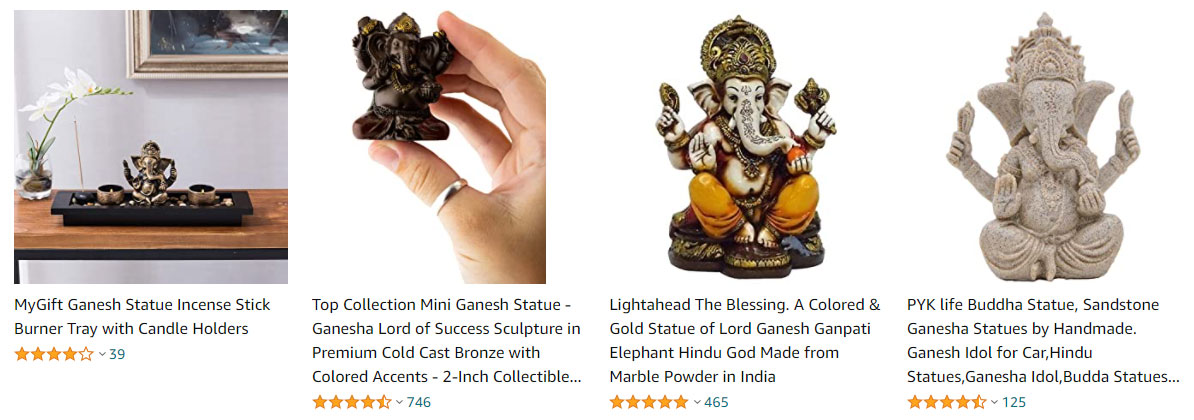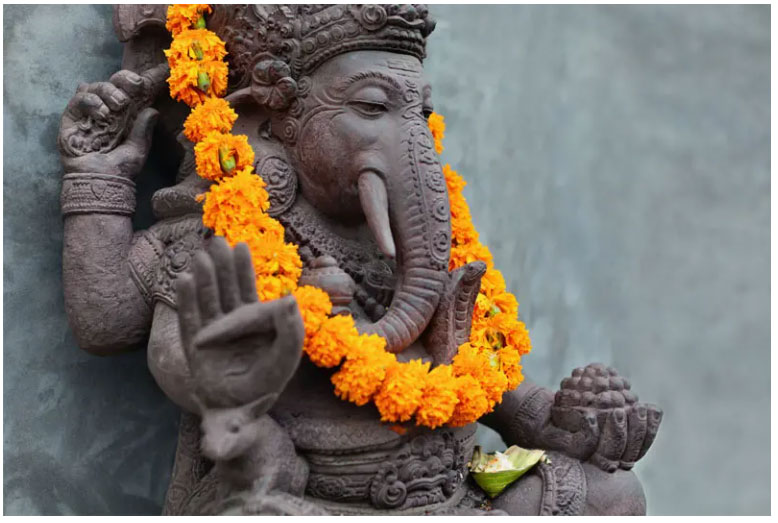Ganesh Meaning
In the Hindu religion Ganesh is considered a God who removes obstacles, the God of wisdom, education, prudence, intelligence, and the head of schools and scholars. He is particularly recognizable by his elephant head. The myth and symbolism surrounding him make him one of the most revered Gods of India and Asian countries among others.
In the Hindu religion, he is the son of Shiva and Pârvatî, the husband of Siddhi (representing success), of Buddhi (representing intelligence) and finally the husband of Riddhî (representing wealth).
Representation, meaning and symbols
Ganesh is most often depicted with the body and head of an elephant, having four arms and a single tusk. His vehicle, also called vâhana, is represented by a rat or a mouse named Mûshika. Very present in mythology, Mûshika can sometimes represent Ganesh alone.
Ganesh has many attributes, the most frequent of which are :
• The broken defense: it knows mainly two interpretations. The first tells that Ganesh used his defense to write the Veda or Mahābhārata. The second tells of the meeting between Ganesh and Parashurama. The latter was visiting Shiva, but was intercepted by Ganesh, so he cut his defense with the axe he had in his possession. The elephant God let himself be struck without resistance and lost his tusk.
• The axe: weapon given by Shiva (Ganesh's father). It destroys all desires and attachment.
• The elephant sting: symbolizes Ganesh's mastery over the world.
• The noose: allows to capture errors.
• The mâlâ: a rosary consisting of 50 letters of the Sanskrit alphabet.
• The bowl of sweets: rewards the seeker of truth.
• Sometimes, in some representations, Ganesh also holds a fruit in his hand (a mango or a lemon).
His position is most often seated, on a lotus throne. One of his legs is bent while the other hangs in the air.
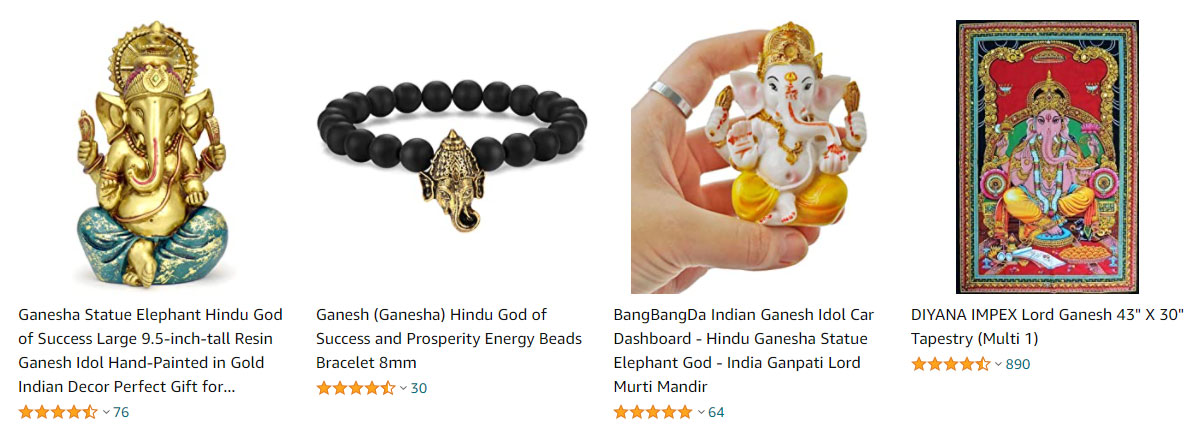
Genesis of the elephant
Several stories have been built up over the centuries to explain how Ganesh obtained his elephant body.
One of the best known is this one: Shiva was returning from an intense period of meditation in the Himalayas, when he found a young man blocking his access to his house while his wife Pârvatî was taking her bath. The boy was none other than her son. She had created him with dust and pieces of his skin that she had scraped off in her bath. The aim was for the boy to keep her company during her moments of loneliness. Furious, Shiva cut off the boy's head (her half-son) with his sword. The head rolled very far and was not found. Pârvatî, then inconsolable, asked Shiva to revive his son. The husband promised to replace the boy's head with that of the first child who would be alone without his mother. He then found a young elephant calf. This myth takes an important place in the notion of maternity and paternity.
A variant tells that when Paarvathi presented Ganesh to Shiva after his birth, the latter opened his third eye and burned his head. He begged Shiva to replace the head, so he took the head of an elephant that was passing by.
Another story tells that Ganesh's head is thought to be due to the position adopted at conception, which resembled the shape of a couple of elephants.
Symbolism of Ganesh
Ganesh embodies an important notion: man can appear in the image of God, which is there represented by the head of an elephant, his thought represents the universe and allows precisely to understand this universe and to develop intelligence while removing ignorance.
With each action we take, we must consider that man is part of the divine. Ganesh must therefore always be prayed to first during religious rituals.
When we speak of Ganesh who removes obstacles, we necessarily think of the elephant, which by its strength and its tusks makes its way through the enormous branches and other masses.
According to the beliefs, no project is possible if Ganesh has not been prayed to beforehand. Every human must thus fulfill this duty if he wishes to obtain good fortune in his enterprise. Indeed, when Ganesh was born, his father established the idea that his son should be invoked through prayers if we want to succeed in our various actions. Each deity must be invoked with a prayer to the elephant God.
An anecdote tells us that Shiva, who went to war against demons, forgot his own rule and found himself immobilized on his chariot when a wheel broke. He then realized that he had forgotten to pray to his son, and that this had caused the incident. He then invoked him and was able to go and win his battle successfully.
Ganesh represents a kind of intermediary between the different Gods, it is necessary to go through him to be able to invoke the others. He also represents spiritual strength and protects the crops. Indeed he controls the rat and prevents it from multiplying so as not to devastate the crops. It also protects homes, by its strength and benevolence.
Hierarchically, Ganesh is also superior to other Gods (apart from Brama, Vishnu and Shiva). He is also the patron of schools, letters and writers.
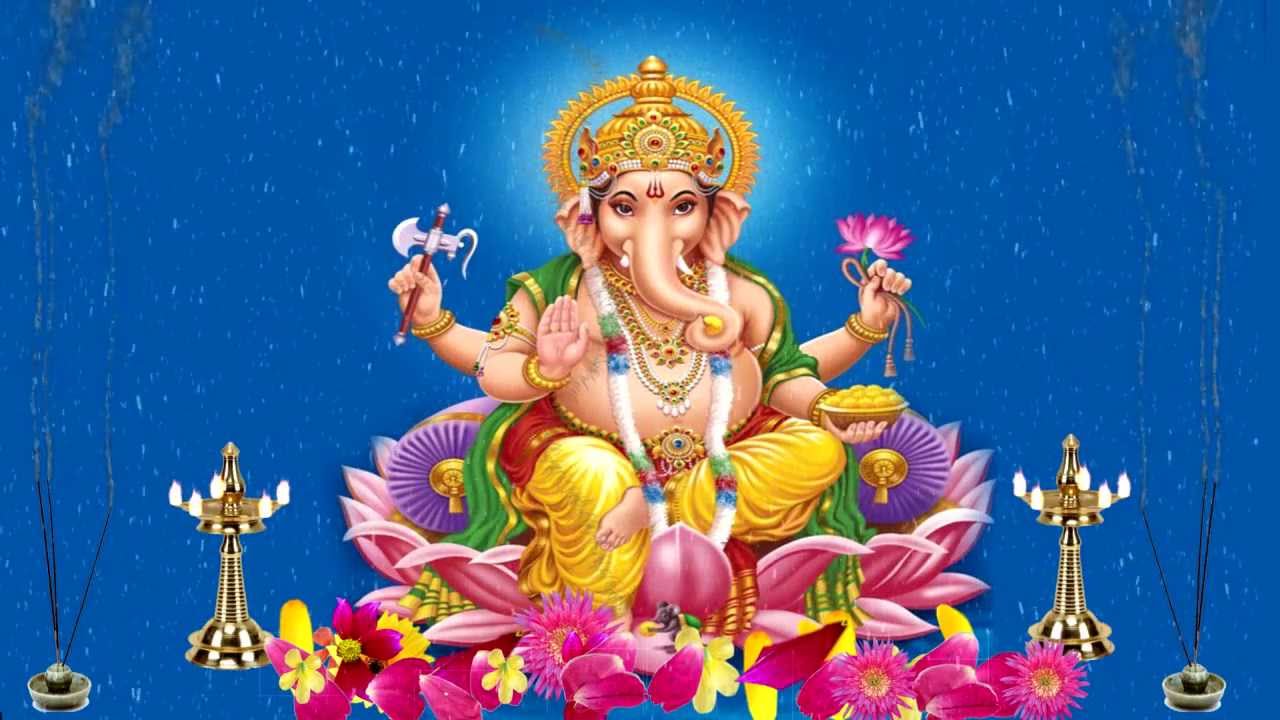
The ritual in Ganesh and its meaning
Many rituals in Ganesh exist, however here is an example of one of the most frequently practiced:
The ceremony begins with a tribute to the different Gods and particularly to Ganesh, Kali, and Shiva. Practitioners sit around an altar with a small statue of Ganesh, surrounded by four candles, flowers, and various offerings (two per participant, one of fire and one of sweets). Incense completes the picture. The participants will have to recite the 108 mantras by means of their rosary (mala). They also have a musical instrument, which allows them to play together at key moments of the ritual. Sometimes wine is also present, and believers can share it.
Afterwards, everyone will draw the swastika symbol on paper and then sit on it to connect to the muladhara Chakra. Ganesh will then be represented with the mantra om shri ganeshaya nama. Its representation will increase until it becomes one with the body, and allows contact with the deity.
Thereafter, the mantra om shri Ganapati gam gam gam gam will be repeated in heart by all the participants. One will also be able to make a wish (without saying it out loud). A long silence must follow this stage of the ritual, then the ritual will end with a new homage to the Gods and a good meal in joy and good mood.
A Ceremony in Honor of Ganesh
Maharashtra (a state in western India) is an important celebration of the elephant God. The festival lasts ten days. Each participant worships a fabricated idol during these ten days, then on the last day the deities are immersed in water. In Bombay the immersion takes place in the Arabian Sea and in Pune it takes place in the Mula-Mutha river.
This ceremony was originally created to develop the patriotic feeling of India when it was under the yoke of English domination.
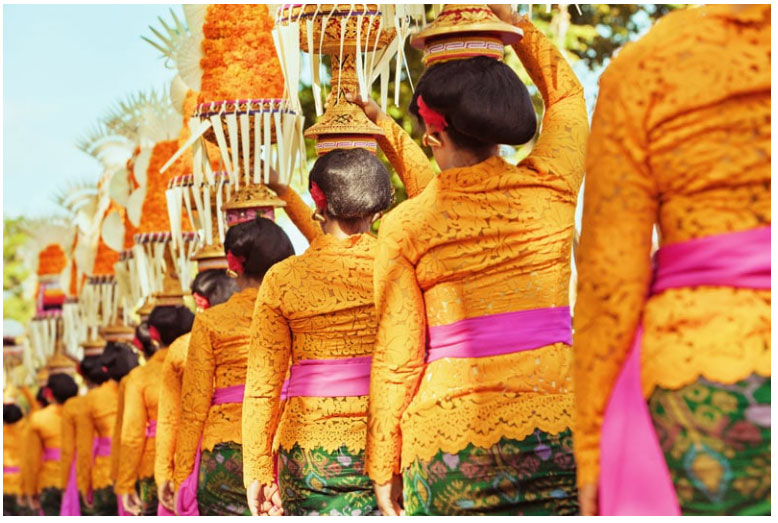
Representing Ganesh in the world
Ganesh is represented in several countries outside India, including :
• In Japan, in the esoteric Buddhist religion, he is represented by a couple of embracing elephants. He is revered for increasing joy and harmony.
• In Indonesia, he is the symbol of the Bandung Institute of Technology, a major engineering school. This refers directly to the symbolism of knowledge and intelligence.
• In France in Paris, Ganesh is prayed to in the temple "Sri Manicka Vinayakar Alayam".
Other names of Ganesh
Ganesh has many other names, including :
Ganapati: the chief of the Ganas
Vinâyaka: the great guide
Gajânana: head of elephant
Gajâdhipa: the king of the elephants
Vighneshvara: the master of obstacles
Vighnahartā : the one who pushes back the obstacles

Ganesh
Why choose Ganesh?
This God is the symbol of joy, happiness and success in the actions undertaken. For this reason, it is useful to worship him before starting a new project. If you are faithful to him, he can bring you a lot. Every obstacle in your path will be erased and he will guide you towards success.
Where to place it?
You must be careful to place your statue correctly in order to strengthen its power. The science of ancient Indian architecture (Vastu shastra) recommends placing the Elephant God in the northeast corner of your home. In addition to the statuette, why not install a meditation corner? In addition to being a place of rest and serenity, it will be of the most beautiful effect in your interior.
What color?
White Ganesh is rather synonymous with peace and prosperity, but also with the search for happiness. While Ganesh with an orange hue is rather intended for those who wish to develop spiritually and socially.
Which representation?
The position of the statue to be preferred is that of a seated Ganesh. It favors calm, and a good circulation of energy. The trunk must also be inclined towards the left hand of the God. It represents success and happiness. On the other hand, the opposite trunk represents the power of the sun, which can become dangerous if you do not respect it! If you are considering placing an idol at work, favor Ganesh in a standing position, which will represent energy and enthusiasm.
Complete the decor
It is preferable, in addition to the statue, to also place a rat and a bowl of candy in order to respect the sacred ritual. The mammal will represent material desire, and the bowl of sweets represents resilience in the face of pleasure (sweets should not be eaten of course).
How many statues?
If you install an altar, make sure you put only one idol. Two Ganesh could cause terrible inconvenience as their energies will meet and fight each other.
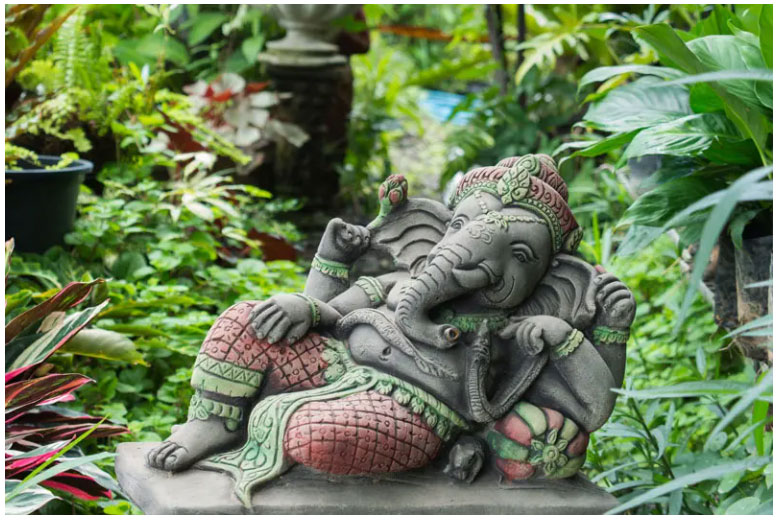
Conclusion
One could consider Ganesh as a being apart. Half-man half-God, he has imposed on the sons of the centuries a true cult to men who idolize him more and more. Recognizable among a thousand, his attributes allow him to have great powers. To venerate him is to follow the path of happiness, success and prosperity. With him, no obstacle will stop you. Particularly present in the Hindu culture, many followers are found throughout the world. And you, do you believe in Ganesh and more generally in the Gods of the Hindu religion? Do you practice sacred rituals?
